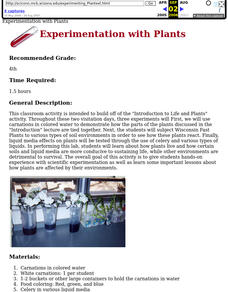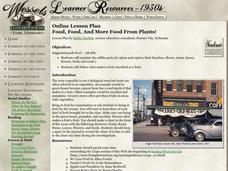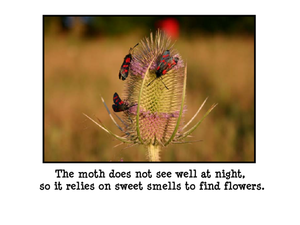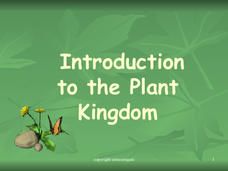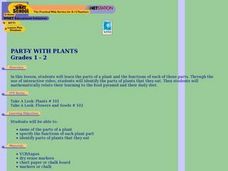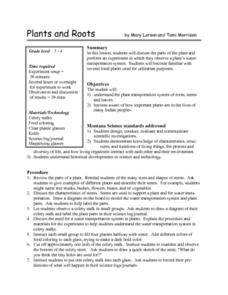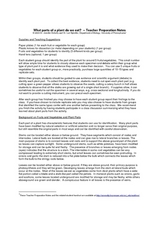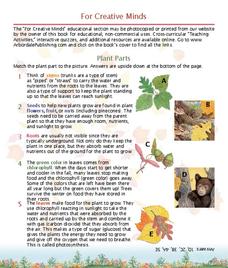Curated OER
Plants And Pollination
Students describe sexual reproduction in plants, including the process of pollination, how insects assist in pollination, and how pollination differs from fertilization. They also explore the importance of honey bees to Arizona agriculture.
Curated OER
Spiders and their Webs
Students investigate spider webs. In this spider web lesson plan, students gain information about spider body parts and how they make their webs. Students simlulate what it is like to be a spider walking on their web. Students illustrate...
Curated OER
How Plants Help Us Breathe
Third graders discuss how humans breathe and how plants help us to stay alive. In groups, they identify and label the different parts of plants and describe their functions. They compare and contrast the ways plants and animals breathe...
Curated OER
Experimentation With Plants
Fourth graders experiment with different varieties of plants and draw conclusions after performing a series of lab activities. A very helpful student worksheet is given. This is a nicely done introductory lesson plan for life science.
Curated OER
Food, Food, And More Food From Plants!
Learners examine the edible parts of a plant and explore their function. They define what makes a fruit classified as a fruit. They create a sketch or map or photo of a 1930s farm and justify their plant selections.
Curated OER
Plants: Scattering Seeds
Middle schoolers collect and microscopically examine seeds from the school yard and neighborhood. In small groups, they draw and discuss the shapes of the seeds to determine each plant's method of dispersal. they also test two types of...
Curated OER
Smarty Plants
Students examine plants and pollinators. In this plant biology lesson, students read The Power of Pollinators and identify the parts of the plant and the pollinators. Students design their own imaginary plants.
Curated OER
Habitat for Plants! There's No Place Like Home!
Students compare and contrast conditions necessary for survival of aquatic and terrestrial plants, identify common and scientific names of plants,
and determine correlation between location and plant characteristics. Students then use...
Biology Junction
Introduction to the Plant Kingdom
Plants provide humans with food, shelter, and medications. Scholars gain a better appreciation for plants after learning their functions, divisions, and early ancestors. Each sub-topic includes slides highlighting vocabulary and...
Illinois Department of Natural Resources
Section One: What is Biodiversity?
Four intriguing and scientific activities invite learners to explore the natural resources of their town. The activities cover concepts such as genetic traits, organizing species in a taxonomy, the differences between different species...
Cornell University
Field Day: Be an IPM Detective
Become a pest detective! Individually or in small groups, scholars scout the land to discover which pests—plant and animal—inhabit it, determine whether the pests are endangering the environment, and summarize their findings.
Curated OER
WET Science Lesson #3: Comparison of Aquatic and Terrestrial Plants
Elementary life science explorers compare and contrast aquatic and terrestrial plants (elodea and soybeans) in a Venn diagram. Some background information is provided to support direct instruction, and general instructions are provided...
Curated OER
Party with Plants
Students watch a video on plant parts and identify the function of plant parts. In this plants lesson plan, students identify the parts of plants they eat and relate it back to the food pyramid and perform math problems as they do this.
Curated OER
Plants and Roots
Students discuss the parts of the plant and
perform an experiment in which they observe a plant's water
transportation system. They become familiar with
several local plants used for utilitarian purposes.
Curated OER
Parts of a Plant- Non-Fiction Reading Comprehension
In this parts of a plant non-fiction reading worksheet, students read 2 pages that describe the parts of a plant and their jobs. They answer 10 fill in the blank and 2 short answer questions based on the reading.
Curated OER
Milkweed Plants
Second graders view milkweed plants (or pictures). The describe the plant and discuss ways some butterflies use it as a food source. Students view four pictures of different phases of a milkweed plant's life cycle. They discuss the...
Curated OER
Growth and Changes in Plants
Students investigate the growth and changes in plants. They view a video and discuss the changes in plants. They work in small groups to demonstrate vocabulary words to the class. They visit a green house and take pictures of plants to...
Curated OER
Plant Parts
Students create a model of the parts of a plant. After reviewing the parts of a plant and their function, students working in groups, construct a plant using various provided materials. Their models are labeled and presented to the...
Biology Junction
Introduction to Plants
In this biology lesson, learners identify the different types and parts of the plant. They complete a crossword puzzle with 37 questions about plants.
Curated OER
Which Parts of a Plant Do We Eat?
Young scholars identify the different parts of a plant. In this biology lesson, students examine its internal parts by dissecting it. They report their findings in class.
Curated OER
Eat Your Plants
Students explore fruits and vegetables. In this fruits and vegetables lesson plan, students work in small groups investigating plant parts. Students discover that fruits and vegetables originate from different parts of plants.
Curated OER
Edible Plants
Students determine what part of a plant they are eating when they eat different fruits and vegetables.
Curated OER
Researching Plant Life
Fourth graders examine the process of photosynthesis. Given websites about plant life, 4th graders retrieve and record accurate information about the parts of the plant and photosynthesis. Students solve a "Plant Life Mystery" from...
Curated OER
Plant Parts
Pupils recognize the parts of the plant and the function it provides.In this plant parts lesson, students participate in three activities relating to plant parts and properties.





